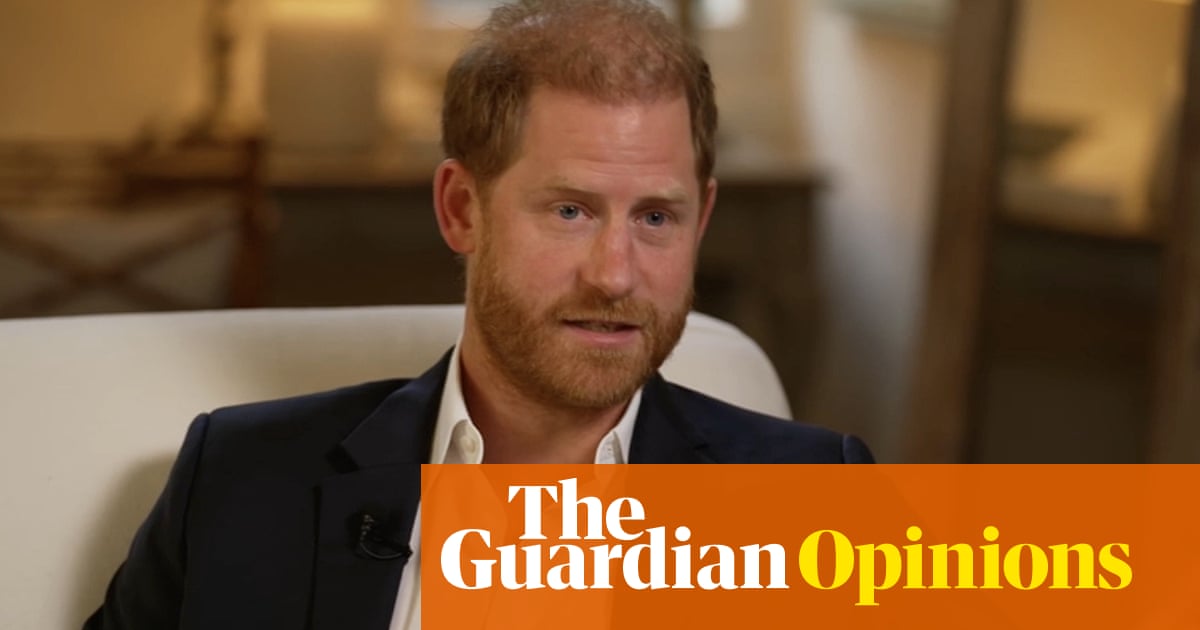The royal family’s motto has been “never complain, never explain” for as long as anyone asking anything as tedious as a question can remember. Royal watchers trot it out as a devilish smart move by a public relations master-breed. They’ve cracked the code of how to retain their dignity, their mystery, their effortless superiority and, maybe in a fair wind, even divinity: simply never say anything.
Personally, I always found it a bit of an impediment to having any feelings for them. Sure, don’t explain if you don’t want to, but complaining to each other is 90% of human intimacy. It’s hard to have a relationship without it, even an imaginary one.
Maybe that’s the way they like us, at arm’s length. The more important thing about this strategy is how epically it does not work.
Last week’sBBC interview with Prince Harryhad an excruciating amount of complaint and explanation, but everything was as mysterious at the end as it had been at the start. He alleged an establishment stitch-up, blocking the funds for his security detail, guiding the hand of the Executive Committee for the Protection of Royalty and Public Figures, yet never stooped to explain what the deep state stands to gain from this vendetta, nor why he and his family haveno problem going to, say, Portugal. He says he’d love a reconciliation with his father, but any idiot could tell him that the worst way to go about that is via a TV interview. Without conveying any concrete, falsifiable information, it somehow managed to be TMI: too much self-justification, too much feeling, too much chagrin, too much of everything.
King Charles, meanwhile, is only nominally sticking to the rules himself. He may not have said anything, but friends have been fielded to say things on his behalf, which is a kind of Jennifer Aniston circa 1994 move. They sound pretty reasonable, the friends: “It’s not that the king won’t speak to him, it’s that he can’t,” said one, who was nameless but definitely “close”, according to the Times. “How can you have a private and delicate conversation when you know it is going to end up on a news special within hours?” Fine, makes sense, but it’s also tawdry; regular people who loved or had ever loved each other, who recognised a thousand different ways that life is short, would just pick up the damn phone. Again, nothing real is said and yet way too much is revealed, or seems to be.
Which is the flaw in their fabled discretion all over – if you never explain small things as you go along, you end up having to explain incredibly large things all at once, or, worse, have them explained for you. As mockable as Meghan, Duchess of Sussex, may be, with herrainbow fruit plate, she is in no way the originator of this paradox. Charles and Diana could have done a much better job of communicating, in sorrow, their marital froideur. Then, a lot of the larger questions that mainly answered themselves – wait, why does he want to be a tampon? How many people in the marriage again? – wouldn’t have come up.
The late Queen Elizabeth spent her life in studied reserve, hiding feelings that would have been inoffensive and very easy to articulate, so that when circumstances required her to emote, it was magnetically hideous to behold. I’m talking, of course, about the violent death of her estranged ex-daughter-in-law. It was a relationship about which, in the vacuum left by discretion, a lot of details had been filled in by common sense. Which is to say, didn’t Diana and the queen kind of hate each other? Couldn’t you see that from space?
So, in September 1997, the sight of the queen, forced to express some heartfelt grief on the spot, was super awks, as the young people say. She came up with, “I admired and respected her, for her energy and commitment to others,” a cut-and-paste job that could have been said about any given member of the royal family at that point, even Prince Andrew.
Prince Harry, of course, broke the rules ages ago. Even before he wroteSpare, his autobiographywith surprising descriptions of Prince William as a raging bull and unnamed royal officials as a white supremacy cult, he was telling it like he found it, on podcasts and documentaries. His feelings by the time he stepped down from royal duties were too large to be contained within a normal narrative, and everybody has come out looking downright peculiar.
It’s time for a new mantra: complain about relatable things, in a modest way, and explain anything slightly unusual that’s going on, before it gets so out of hand that there’s no explaining it, except that you’re all barmy.
Zoe Williams is a Guardian columnist
